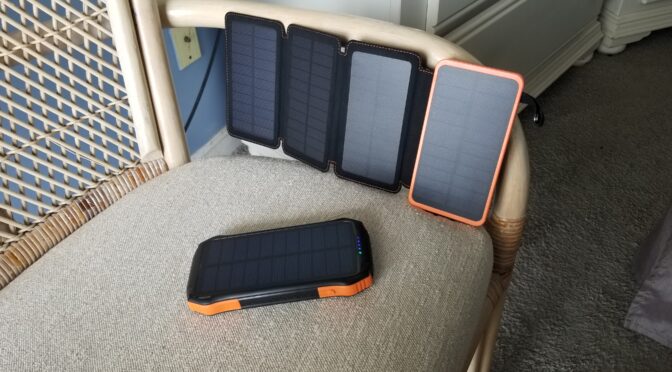These days it is hard for me to go long without a phone. Whether it is checking email or researching something – I need a phone. What does that also mean? I need a way to recharge the phone and the traditional approach woud have been to hoof around a spare USB battery pack. Now, add my wife and multiple devices into the mix plus no easy access to a charger for the battery pack itself and life gets interesting.
I’d seen USB battery packs on Amazon that had integral solar sells and decided to buy two different models to see which met my needs better. During a recent family trip we were able to really put the two units to a real world test and want to share the results with you.
First Up: The Soxono F16W
The F16W is a sleek looking unit with two USB charger pots, a light and integral wireless charger. There is also a pretty rugged rubber cover that seals the ports from water.
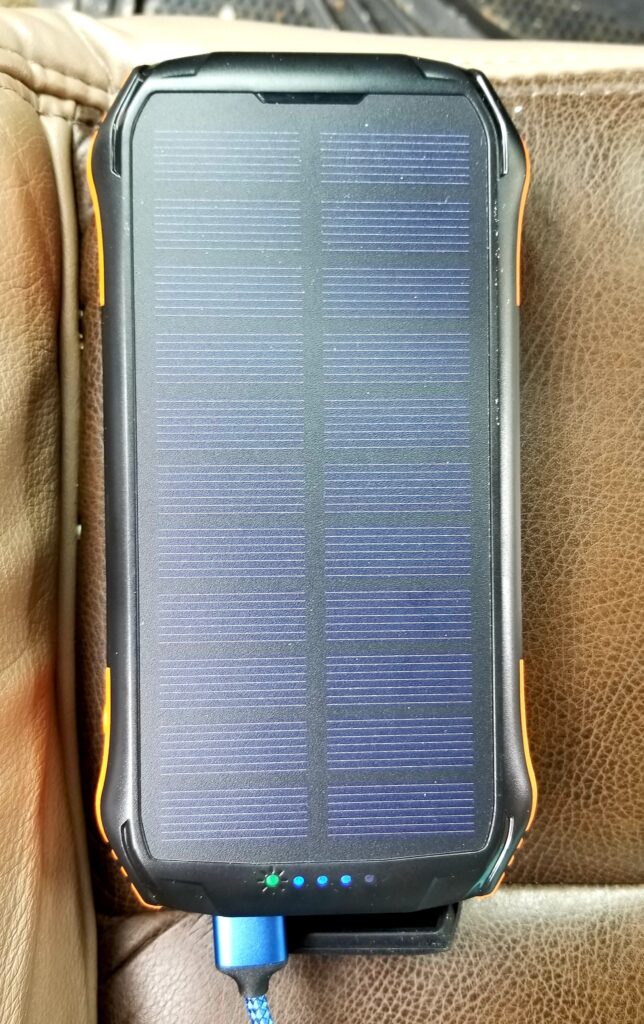
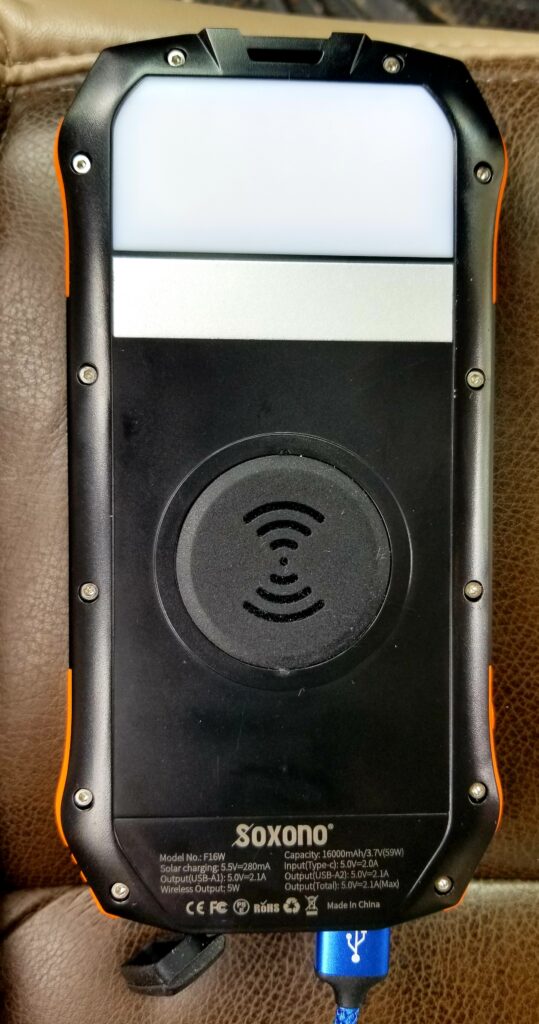
Here are the specs:
| Model: F16W | Capacity: 16,000mAH |
| Solar: 5.5v@280mAH | Input USB-C: 5v@2.0A |
| Output USB-A1: 5v@2.1A | Output USB-A2: 5v@2.1A |
| Wireless output: 5W | Total Output: 5v@2.1A |
| Dimensions LxWxH: 6.7″ x 3.3″ x 0.87″ | Thickness: 0.92″ |
| Weight: 0.78 pounds (12.5 oz) |
This was my first unit to try and it served fairly well as a battery back. My normal pack is a 10,000mAH Anker and I feel that the Anker lasts longer. We charged/topped off my Note 8 a number of times plus my wife’s S10+ once. We were taking a ton of photos and sending them so we were draining the phones quickly.
During the heaviest day of use it got down to one lit LED on its gas gauge and I can’t really say the solar panel made a huge difference for the amount I used it. If you notice, the output is really tiny at 280mAH, which is why it really didn’t help much. It does help some no doubt but it is a trickle compared to how fast you will likely use the battery. Would it be better than nothing? Yeah, but it’s going to take a looooong time to charge that battery depending on the amount of sunlight and temperature.
Now please note something, there are a lot of vendors out there putting a relative few solar cells on the top of their unit and charging a premium. With as small of output as those cells can generate, it would take any brand quite a long time to recharge the battery.
On the plus side, it was decidedly smaller than the next unit and the wireless charging was nice but I switched to cords once I realized the battery seemed to discharge pretty quick. Wireless charging on a battery doesn’t make a ton of sense if you are trying to get the most out of your battery because it is inherently less efficient than charging with a cable. Sure, there is the convenience of not needing cables and if that matters to you then fine and it does work on this unit.
Would I recommend it? No. Get an Anker charger if you don’t care about solar charging and just want a good reliable battery. The solar cells on top really don’t make a difference. If you do want solar, check out the next unit.
By the way, I highly recommend Anker batteries. I’ve literally used them for years and a number of different models. You can choose based on your preferences for size, capacity and number of ports.
Next up: The Hiluckey Outdoor HI-S025
Let me lead with: It’s bigger, it’s heavier and it absolutely did the job. It’s a Chinese product made by Dongguan Jili Intelligent Technology Co., who is a very prolific manufacturer of these types of solar chargers.
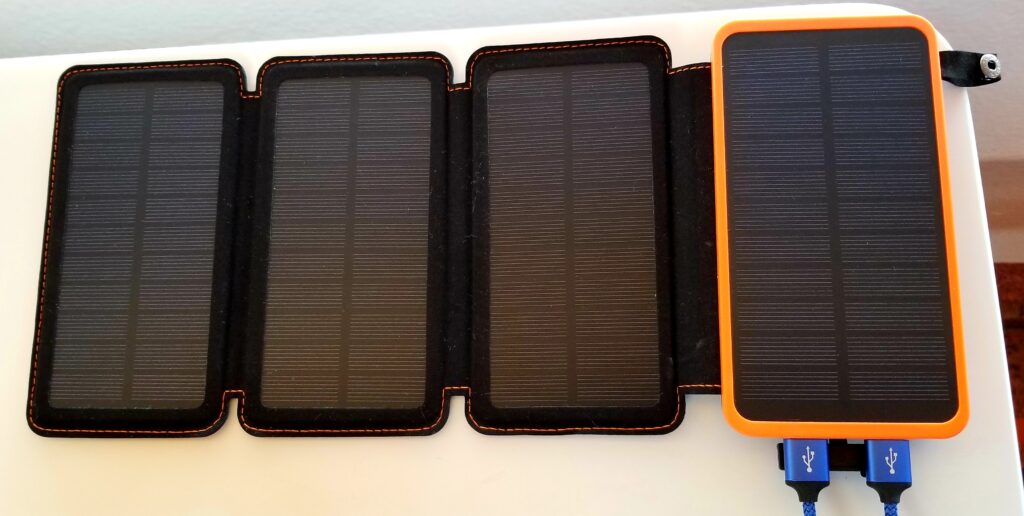
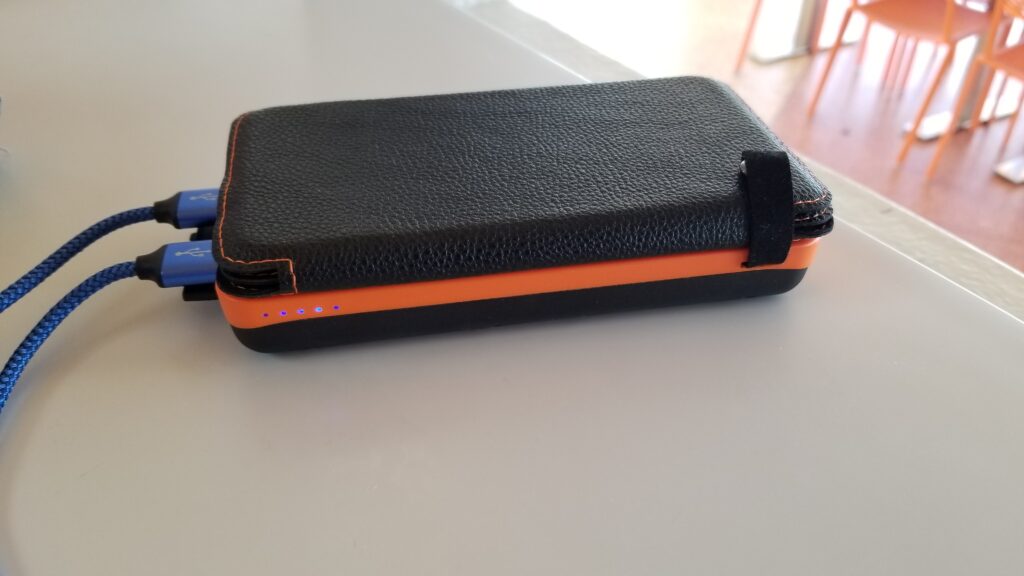
Here are the specs:
| Model: HI-S025 | Capacity: 25,000mAH |
| Solar: 5v@6.0W | Input Micro USB: 5v@2.0A |
| Output USB-A1: 5v@2.1A | Output USB-A2: 5v@2.1A |
| Wireless output: None | Total Output: 5v@2.1A |
| Dimensions LxWxH: 6.1″x3.35″x1.37″ | Unfolded Solar Panel Width Becomes: 13.9″ |
| Thickness Folded: 1.33″ | Main body Thickness: 0.86″ |
| Solar panel thickness: 0.177″ | Weight: 1.29 pounds (20.64oz) |
When I got this out of the box I really was put off by the size just to be honest. I wanted something that would fit in my pocket and the size and weight of this really meant it was better off going in my pack. You know what? It’s worth it.
First off, you have a pretty big battery in terms of capacity – 25,000 mAH and solar cells that generate enough output (6 watts is 6,000 mA by the way and 21.4x the solar panel output of the above unit). That’s not enough to keep up with a device drawing 2.1 amps (10.5 watts) but it is going to help and it is going to recharge the battery faster.
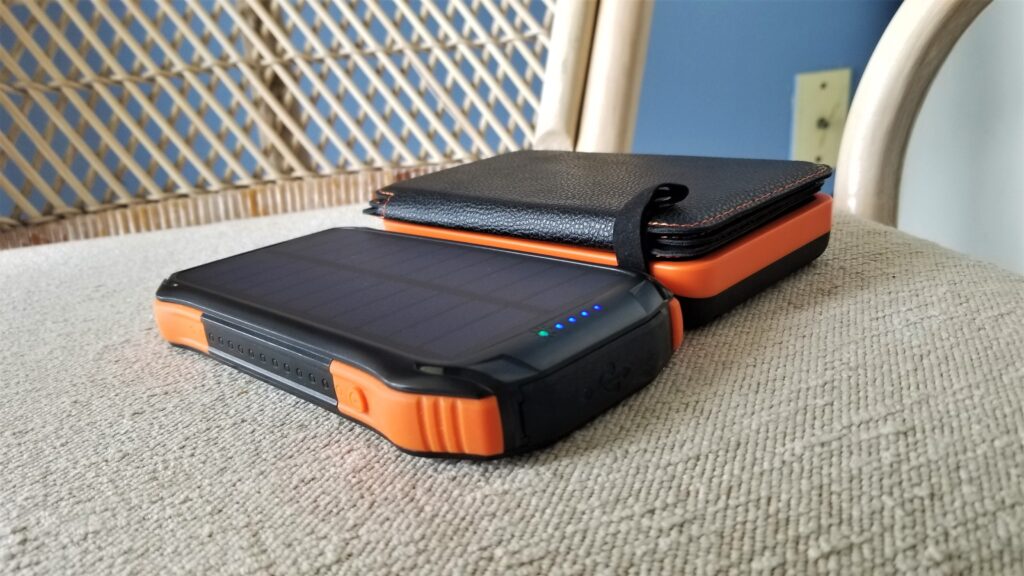
We used this battery extensively over a full day and only lowered the charge from 5 LEDs to three. We did deploy the solar panels a few times and the only cosmetic issue I noted was that the adhesive holding the fabric to the face of one cell got soft and separated. I pressed it back down and it stayed put. It was 93F outside so combine that with being in the sun, that panel was pretty hot.
So, the bottom line is that it is bigger and heavier than a traditional battery-only pack but it worked. I topped my Note 8’s battery a number of times and my wife’s S10+ once with no problems.
Another Option: Dedicated Separate Solar Panels
There is another option that I plan to test – having separate solar panels that have a USB output for charging devices. This would seem to be the best of both worlds – a larger folding solar panel that can charge faster but it is separate from the USB battery that can still go in your pocket. I did some reading of reviews and bought the following unit and forgot to bring it on the trip … yeah, I left it right on the corner of my desk.
In Conclusion
I’d recommend Anker brand batteries for folks needing compact power. I would not recommend the Soxono and I would recommend the HiLuckey HI-S025 to folks who need a big battery that can actually recharge with an attached solar panel. I’ll report back how things go with the dedicated panel when I have time.
Dongguan Jili Intelligent Technology Co
A quick parting comment – I’ve never heard of Dongguan Jili Intelligent Technology Co. before but they make a number of models and brands of batteries and solar related products on Amazon. They all seem to get very good reviews:
If you find this post useful, please share the link on Facebook, with your friends, etc. Your support is much appreciated and if you have any feedback, please email me at in**@*********ps.com. Please note that for links to other websites, we are only paid if there is an affiliate program such as Avantlink, Impact, Amazon and eBay and only if you purchase something. If you’d like to directly contribute towards our continued reporting, please visit our funding page.
